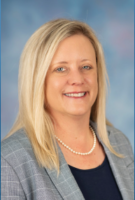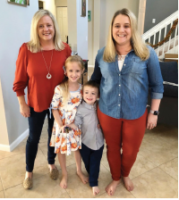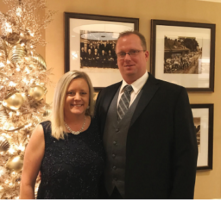With 23 years of working for the City of Auburn in the rearview mirror, Megan McGowen Crouch realizes now that her interview began on day one. Long before becoming a driving force in Auburn’s economic development efforts. Long before becoming the organization’s first executive director of development services. Long before rising to the level of assistant city manager. And long before becoming the City of Auburn’s first female city manager.
 “I’ve always believed in getting up every day and doing the best job that you can—you learn, you work hard and good things will happen,” says Megan. Auburn’s former City Manager Jim Buston retired on Jan. 31, and passed the baton to Megan on Feb. 1. Did she think she’d now sit in the corner office at Auburn City Hall when she first began her career?
“I’ve always believed in getting up every day and doing the best job that you can—you learn, you work hard and good things will happen,” says Megan. Auburn’s former City Manager Jim Buston retired on Jan. 31, and passed the baton to Megan on Feb. 1. Did she think she’d now sit in the corner office at Auburn City Hall when she first began her career?
“The truth is, no,” says Megan. “I thought I would eventually become the Economic Development director and remain in that role until retirement.” Despite that, Megan’s pursuit of excellence and love for her community have led her to this moment in the city’s history.
“I’ve always been this way.”
 A sense of drive has been omnipresent in Megan’s life for as long as she can remember. In a parent-teacher conference in her hometown of Tulare, Calif., Megan’s kindergarten teacher described her drive and work ethic with words that would stick with Megan’s mother for years:
A sense of drive has been omnipresent in Megan’s life for as long as she can remember. In a parent-teacher conference in her hometown of Tulare, Calif., Megan’s kindergarten teacher described her drive and work ethic with words that would stick with Megan’s mother for years:
“She’s a 30-year-old living in a 5-year-old’s body.”
But Megan’s mother also heard less encouraging words from doctors who said Megan wouldn’t fit in as a child because her diet was so limited. They believed the illnesses she battled as a child would make it challenging for her to become successful later in life. But young Megan didn’t realize she had something to overcome—she just went for it.
She could hit a baseball at age 2. While not always the star player on the softball field or the basketball court, Megan excelled in athletics and coaches said time and again that no one would out-work Megan. She joined the marching band in high school playing the baritone and trombone and went on to earn a music scholarship to California State University, Northridge in Los Angeles. Megan began her college career with her sights set on becoming a pharmacist. In her second semester, she took an urban studies class that changed that course.
As a freshman who lived in Los Angeles without a car, Megan saw many of the challenges the City of Los Angeles faced. Her interest was piqued, and she wanted to find solutions. Megan became an urban studies major and volunteered as an intern with the City of Burbank’s Planning Department. Volunteering turned into a paid internship with Burbank’s Community Development Department. There, she learned about budgeting, public transit and disaster management. When an earthquake hit and the interstate collapsed, Megan was part of a team working long days to man- age the increased capacity on their commuter rails.
This was where Megan truly got her start in public service.
Moving East
 Post-graduation, she took an opportunity to travel the country working for her sorority, Alpha Xi Delta, before jumping into municipal work. Megan traveled to 80 universities in 40 states over two years and used that time to scout out graduate schools. One trip took her to Auburn, and shortly after, she began pursuing a master’s in community planning at Auburn University in 1996. Three quarters into grad school, an intern- ship opened with the City of Auburn’s Planning Department, and so began Megan’s career with the City of Auburn. Less than a year into her position as a city planner, her work ethic and desire for excellence caught the eye of others in the organization. Economic Development Director Phillip Dunlap had created the city’s first Economic Development Department in 1984, and the department was growing.
Post-graduation, she took an opportunity to travel the country working for her sorority, Alpha Xi Delta, before jumping into municipal work. Megan traveled to 80 universities in 40 states over two years and used that time to scout out graduate schools. One trip took her to Auburn, and shortly after, she began pursuing a master’s in community planning at Auburn University in 1996. Three quarters into grad school, an intern- ship opened with the City of Auburn’s Planning Department, and so began Megan’s career with the City of Auburn. Less than a year into her position as a city planner, her work ethic and desire for excellence caught the eye of others in the organization. Economic Development Director Phillip Dunlap had created the city’s first Economic Development Department in 1984, and the department was growing.
“Some people have a certain spark that you can tell that they get it—they want to win,” says Dunlap. “Megan has always had a tremendous amount of drive and a desire to be the best that she could possibly be. When you take that kind of drive in an individual and focus it on the organization and its goals, then you have someone who is going to be very successful.” Phillip offered Megan a job in Economic Development, vowing to invest in her and grow her position as she grew. She had one night to think it over.
“I needed to decide if I was going to commit to living in Auburn long-term,” Megan remembered. “I had learned very quickly that Auburn was a great place to live. At the time, I didn’t know I’d be here my entire career, but I knew I’d be here awhile. And I knew that the city was going to provide opportunities I wouldn’t have in other organizations.” She accepted the job and would spend the next 20 years working under Phillip’s wing.
Fostering Investment
 Her role in Economic Development introduced her to many different stakeholders: city departments, the business community, civic groups and others. She’s held positions on the Auburn Chamber of Commerce Board of Directors, the Economic Development Association of Alabama Board of Directors and worked with the International City/ County Management Association and the Urban Institute to provide economic development and strategic planning
Her role in Economic Development introduced her to many different stakeholders: city departments, the business community, civic groups and others. She’s held positions on the Auburn Chamber of Commerce Board of Directors, the Economic Development Association of Alabama Board of Directors and worked with the International City/ County Management Association and the Urban Institute to provide economic development and strategic planning
training in Bulgaria, Serbia and Kosovo. Megan learned “a little about a lot of things and sometimes a lot about a lot of things.” She learned about citizens’ concerns and policy as she began attending City Council meetings. She learned the finesse of recruiting the right companies that will invest in Auburn without sacrificing the community’s quality of life.
“Our goal was to diversify our economy enough to where our manufacturing employment would equal the full-time employment of Auburn University,” says Megan. “This stabilized our economy and ensured that we weren’t dependent on any one sector for our economic livelihood.” She helped secure that diversity by recruiting companies like GE Aviation, whose Auburn location was the first to mass produce engine components using 3-D printing. This and the other 49 industrial projects in which Megan has been involved have generated more than $1.1 billion of capital investment and created 4,460 jobs. A large part of recruiting was making sure companies had a place to thrive. Megan was the project manager for Auburn Technology Park North, the city-owned 200-acre technology and manufacturing park. She also managed the design and construction of infrastructure for phase one of the Auburn Research Park off South College Street, helping foster one of the cornerstones of Auburn’s industrial efforts—the city’s partnership with Auburn University.
With sales tax as the primary revenue for the city, another key element of economic development is bringing the right mix of commercial businesses to the area. In 2011, she was part of a team that created the Commercial Development Incentive Program to provide incentive packages for those investing in Auburn. The program has benefited 28 projects so far, including Ross House Coffee, The Depot, the Auburn Mall and most of Auburn’s shopping centers.
Out of all these efforts, Megan believes her work on the Renew Opelika Road Plan is some of the most valuable of her career. The City has steadily invested in the area since the plan’s adoption in 2013, and the private sector has followed. Revenue generated along the corridor now far exceeds that of when the Auburn Mall was fully occupied and the old K-Mart was in full swing, and even more new businesses are expected to come to the area soon.
Becoming City Manager
In 2018, Buston promoted Megan to lead the city’s five development-related departments as the first executive director of development services. A little over a year later, Megan became the assistant city manager and chief operating officer. Though only comprising two years of her career, these positions coupled with the vast experience she gained in her economic development days gave her many tools needed to lead a growing, dynamic city like Auburn. She gained institutional knowledge by sitting in council meetings and working on plans and projects throughout the city. This knowledge gave her an understanding of where the city has been and where it’s headed. Closely working with other departments gave her insight into efficiencies that could be replicated elsewhere.
“Megan constantly looks for ways to improve what and how we do things to provide the best service to Auburn’s residents,” said Engineering Services Director Alison Frazier, who has worked with Megan for more than 20 years. “I have found her drive, determination and dedication as traits to be modeled and emulated.” By taking opportunities and gleaning what she could from those who came before, she learned what being city manager is really about—the small things. While in Economic Development, she was invited to lunch with former City Manager Doug Watson and other department heads. That invite was extended again and again, and she soaked up what she could. They would discuss capital projects and drive by them to and from lunch. She would hear him call city employees and leave messages about litter, graffiti, cracks in the sidewalk and so many other seemingly “small” things.
“Megan has never been one to let an opportunity pass by,” says Buston. “No matter her position on the organizational chart, she’s always been willing to learn and to pour herself into becoming better. She serves Auburn with everything she has, and that heart of service is what truly makes her a great fit to lead Auburn into its next chapter.”
 Moving into her first year as city manager, Megan plans to continue the solid foundation that was laid before her and keep the city operating efficiently. As she sets goals for the future, a primary driving force will be Auburn 2040, the community visioning and strategic planning initiative that will create a road- map for the next 20 years. The initiative was delayed because of the pandemic, but is currently planned to kick off this spring.
Moving into her first year as city manager, Megan plans to continue the solid foundation that was laid before her and keep the city operating efficiently. As she sets goals for the future, a primary driving force will be Auburn 2040, the community visioning and strategic planning initiative that will create a road- map for the next 20 years. The initiative was delayed because of the pandemic, but is currently planned to kick off this spring.
“Auburn’s a great community, and I intend to continue to work to make it even better,” says Megan. “But I also want to work to celebrate all that we are. Because sometimes we don’t take time to stop and smell the roses, and there’s a tremendous number of positive things that happen here. There have been four Auburn city managers who have come before me who were great stewards of the city, and I will do the same. I’m grateful, and I’m ready.”
Megan lives in Auburn with her husband, Matt Crouch, and their two Bengal kittens, which she affectionately refers to as “terrors.” When not in the office, you may find Megan spending time with her six nieces and nephews, serving as the national vice president for her sorority or on the statistics crew for Auburn University Women’s Basketball. You can reach her at [email protected].


